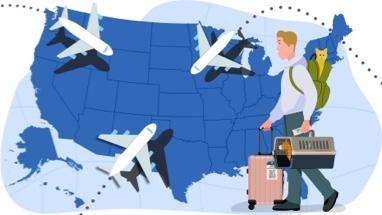Pet Travel From the United States to New Zealand
Travel Requirements Based on Pet Type
Carefully read ALL of the requirements related to your pet on this page.
- This page provides the most recent entry requirements and can change without notice.
- It is the responsibility of the veterinarian to make sure the pet has met all health requirements of the destination country before issuing a health certificate.
- Failure to meet the requirements may result in problems gaining certificate endorsement or difficulties upon arrival in the destination country.
- Health certificates must be legible, accurate, and complete.
Notification from New Zealand's government: Import permit application cut-off date is November 8, 2024. Import permit applications submitted after November 8, 2024, will be assessed by the Ministry for Primary Industries (MPI) as soon as they are able. However, they can give no guarantee that permits submitted after November 8 will be processed prior to February 28, 2025.
- Visit New Zealand's website for complete and up-to-date information, as well as a printable checklist (see "Resources") for traveling with your pet to New Zealand.
- The following animal breeds are prohibited:
- Dogs: Brazilian Fila, Dog Argentino, Japanese Tosa, Perro de Presa Canario, American Pit Bull Terrier (any type), hybrid species (any type)
- Cats: Hybrid species, except for Bengal cats with documentation showing five generations of domestic ancestry
- Requirements:
- Download the guidance document for cats and dogs
- View the step-by-step guide to bringing cats and dogs to New Zealand
- The mainland United States, Puerto Rico, U.S. Virgin Islands, and Northern Mariana Islands are considered a Category 3 country (rabies absent or well-controlled).
- Hawaii, Guam, and American Samoa are considered a Category 2 country (rabies-free).
Upon Arrival in New Zealand
The following documents must be presented:
- An import permit issued by the MPI (copy acceptable)
- Permit to import applications can be found on the MPI website.
- Completed applications should be submitted to Animal Imports (animalimports@mpi.govt.nz) at least 20 business days in advance of the date you need the permit.
- Health Certificate A issued by a USDA-accredited veterinarian and endorsed by APHIS, and Health Certificate B issued and endorsed by APHIS
- Original laboratory reports or copies of laboratory reports endorsed by APHIS
- Effective immediately, New Zealand will no longer accept the 2ME-RSAT test as the stand-alone test for Brucella canis testing for dogs. The approved tests for Brucella canis are: RSAT (not the 2ME-RSAT), TAT, CPAg-AGID, and IFAT.
- The laboratory reports must include:
- Unique microchip identification for each animal, consistent with the health certificate
- Dates of sample collection
- Test type
- Test result
- Original vaccination records (not required for cats from Category 2 States or Territories)
- If the pet is on any medication, a copy of the veterinarian's prescription and a Declaration of Medicines. The pet's microchip must be on all documentation.
- Importer dog breed declaration (to be provided upon arrival in New Zealand).
Your pet will be inspected by New Zealand officials. You will need to contact MPI at least 72 hours before travel to arrange for this veterinary inspection.
Your pet will be quarantined upon arrival in New Zealand for at least 10 days.
Health Certificates
- View the latest version (June 2025) of acceptable external and internal parasite treatments for cats and dogs to New Zealand (94.02 KB)
- Note: This list is not exhaustive and combinations of products can be used. This list is also subject to change without notice.
- Mainland United States, Puerto Rico, U.S. Virgin Islands, and Northern Mariana Islands:
- International Health Certificate A (170.33 KB) to be issued by a USDA-accredited veterinarian and endorsed by APHIS
- International Health Certificate B (100.23 KB) to be issued and endorsed by APHIS
- Hawaii, Guam, and American Samoa:
- Note: For cats and dogs traveling from Hawaii to New Zealand, New Zealand confirmed they will accept the official seals being placed on the crates by a USDA-accredited veterinarian.
- International Health Certificate A (163.99 KB) to be issued by a USDA-accredited veterinarian and endorsed by APHIS
- International Health Certificate B (121.26 KB) to be issued and endorsed by APHIS
For pet travel requirements not listed, APHIS has not been officially informed by the foreign country about the requirements for your pet’s travel. We recommend that you contact a government official of the country you are traveling to for more information.
Country of Destination Contact Information
Countries Participating in the European Union
Austria
Belgium
Bulgaria
Croatia
Cyprus
Czech Republic
Denmark
Estonia
Finland
France
Germany
Greece
Hungary
Republic of Ireland
Italy
Latvia
Lithuania
Luxembourg
Malta
Netherlands
Northern Ireland*
Norway**
Poland
Portugal
Romania
Slovakia
Slovenia
Spain
Sweden
Switzerland**
* Northern Ireland is part of the United Kingdom (UK), but will continue to follow European Union (EU) requirements even though the UK is no longer part of the EU.
** Norway and Switzerland are not part of the EU but have adopted EU legislation for import of most species of live animals.
Need Help?
Still Have Questions?
USDA-Accredited Veterinarians
Contact a USDA-accredited veterinarian for questions about your destination country's entry requirements for pets (including any needed vaccinations, tests, or treatments) and for issuance of health certificates.
Find a USDA-Accredited Veterinarian
USDA Endorsement Offices
Contact your nearest APHIS Veterinary Export Trade Services Endorsement Office for questions about endorsing a health certificate for pets.
Looking for Another Country?
Find your destination country requirements by using the dropdown menu below. If your country is not listed in the menu, visit Pet Travel: Unknown Requirements.




